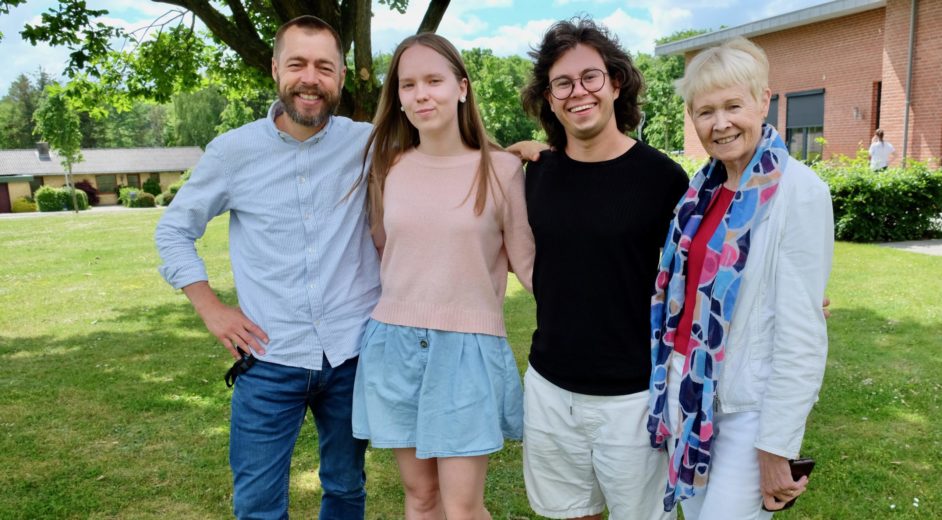Folk High School Creates Long-term Danish/Baltic Exchange Project
An awareness of one’s own privileges, more democratic education for all and, last but not least, happy folk school students. These are some of the clear impressions left by the exchange project established between Mariager Folk High School and the school NextStep Piiblikool.
By Joan Rask
“Over and over again I remind myself of how important mental health is. Eastern European countries don’t prioritise it much – it’s a taboo, a vague and indistinct thing. But it is real! That’s what I experienced here!”
This is what Ken Rebane, a third-year student from Estonia at Mariager Folk High School, says. A long-term exchange project between Mariager Folk High School has, for a few years now, made it possible for four to five Estonian students to travel to Denmark. Here, they participate in classes alongside Danish and other international students.
For Ken Rebane, it has been a positive, life-changing experience. You can see the joy and happiness radiating from his eyes when he thinks back on the day he was told he would be going to Denmark.
“It was my dream to come here – almost a miracle! I never thought it would happen, as I would never have been able to pay for the cost of my stay,” he says.
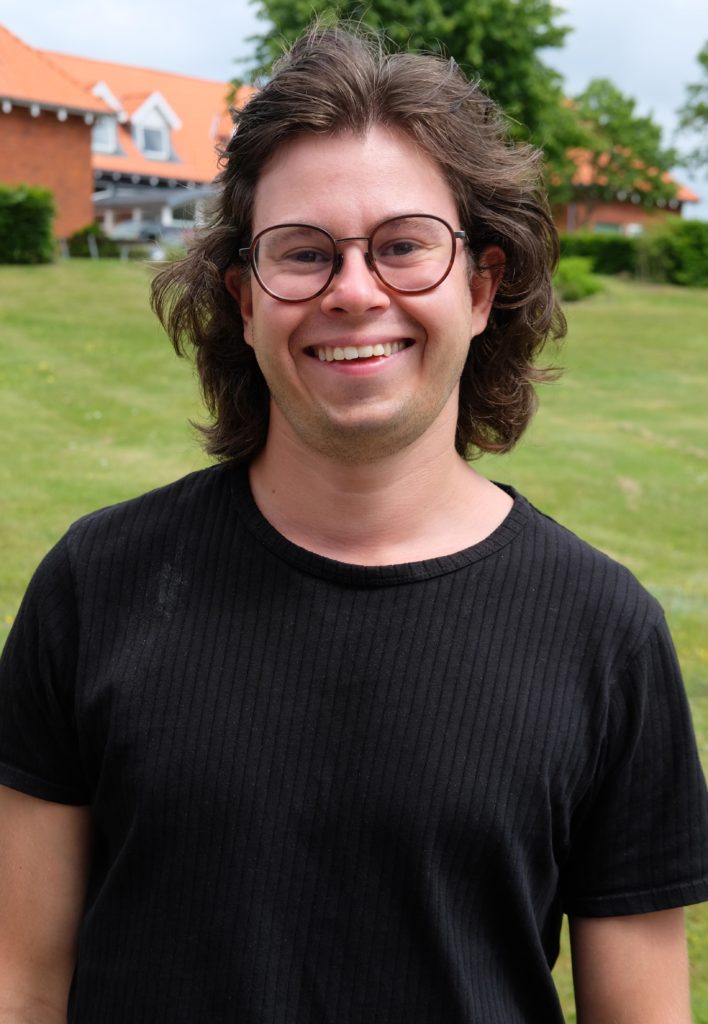
Backed by Nordplus funding
They have a lot of international students at Mariager High Folk School, with approximately 30% international and 70% Danish students. It creates a thriving international environment at the school, which is perfectly located right by a historic Danish town, with the forest and the fjord as its closest neighbours. To Simon Linde, a long-time teacher at the folk school, the international students and the deep collaboration with the Estonian school is a very welcome ‘disruption’ to the classes and to everyday life at the folk school.
”Having international students offers a greater perspective, and meeting others with a completely different background and life story enriches the experience our Danish students have. The Estonian students have a long and complicated history with Eastern Europe that is deeply rooted in them,” he says.
Simon Linde explains that, when Danish students are met with completely different ways of understanding and looking at democracy, trust in authorities and institutions, freedom of speech and the way that people interact, their horizons expand. He believes it is important for the young people to meet people their own age whose circumstances in their home countries are completely different from their own – and everyone must work together to acknowledge and come to terms with this.
”I normally bring this up during assemblies, because, when you have lived for 70 years under a communist regime, coming to terms with the development of a democracy and having it become part of one’s culture, is still a work in process. It is a reminder for the Western students not to take democracy and the rights given to them for granted”
From folk high school student to leader
Simon Graf is a former student at Mariager Folk School and one of the co-initiators in the establishment of NextStep Piiblikool. In 2016, he and two other young people managed to secure the funds and support to build a whole new folk school in Tallinn. Mariager High Folk School was a direct source of inspiration for this and they have happily shared not only teaching resources and teaching-systems, but also good advice.
”We and NextStep Piiblikool are here for the sake of the students, for them to better understand themselves and for them to choose their own path in life,” he says.
The three entrepreneurs have all taken turns leading the school for three-year periods. Today, Simon Graf is a member of the board, works as a priest, is married to an Estonian and speaks Estonian almost fluently. The Piiblikool project has become a part of his DNA. His own dream is that NextStep Piiblikool will continue to grow and attract more students – preferably in close collaboration with the Nordic countries.
“We believe in this school and we believe that education is important. Other schools have weekend courses and week-long courses, but a full-time course, where we can really challenge and nurture the students’ way of seeing others and provide them with a European perspective, leaves them with a much more powerful experience and a far better opportunity to learn,” he says.
The young entrepreneur admits that the funding of the school is a bit of a challenge – for them as well as for the students. The course itself is not that expensive, but while they study, the students have to pay for food, rent, etc. themselves.
“The support from Nordplus has made something possible that would have been completely impossible without it! We are really happy with our collaboration with Nordplus and Mariager Folk High School. It offers our students a really unique experience with and in another culture. It’s very rewarding, both for the students and the teachers,” Simon Graf explains.
Continuity gives rise to high quality
Simon Linde admits that he does not have the same deep understanding of the home countries of some of the other international students. For both Mariager High Folk School and NextStep Piiblikool, having formally collaborated for years gives each one something really special.
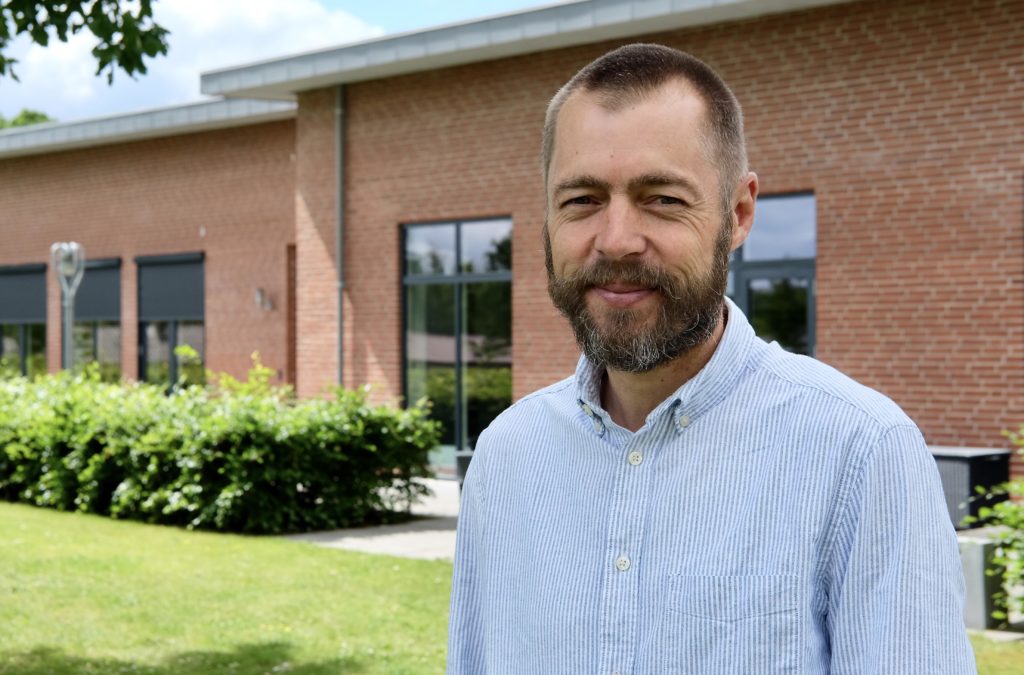
”Experiences add up! I can recognise something special in new Estonian students, because I have learnt something from my experiences with former Estonian students. In this way it is very rewarding to be working with the same country and the same institution, since it makes it easier for me to understand the more complex structures,” Simon Linde says.
”For example, I get the sense that the understanding in Estonia about the West is that it is a free-for-all and the ultimate that you can achieve when it comes to a level of education, high living standards, the economy, and so on. I sometimes have the feeling that the Estonian students look down on themselves and think that the circumstances they come from cannot really compare to what they have become a part of. In comes the doubt: do I have anything to offer them, then?”
Past experiences from Mariager Folk High School make it clear to the teachers that it is important to put this feeling into words. They have to make sure that the Estonian and international students understand their own worth and understand that the folk school is all about democratic education and the belief that everyone, no matter their background, has something to contribute with in a community.
It sure looks like the folk high school is onto something. Every single group from Estonia is thoroughly evaluated by external consultants who interview the Estonian students and ask them about their stay. By doing this, the folk school knows that the students generally find it both scary, exciting, and very much out of their comfort zone. However, it is also clear that the stay becomes a crucial and positive life experience for almost all the Estonian students.
This certainly applies to Ken Rebane, a former student at NextStep Piiblikool and a current student at Mariager Folk High School. Both schools are based around a Christian set of values, and this was what brought on the collaboration between the schools in the first place. To Ken Rebane, then, it was as if his faith led him to Denmark. An international network and a Nordic folk high school state of mind was certainly not something he grew up with.
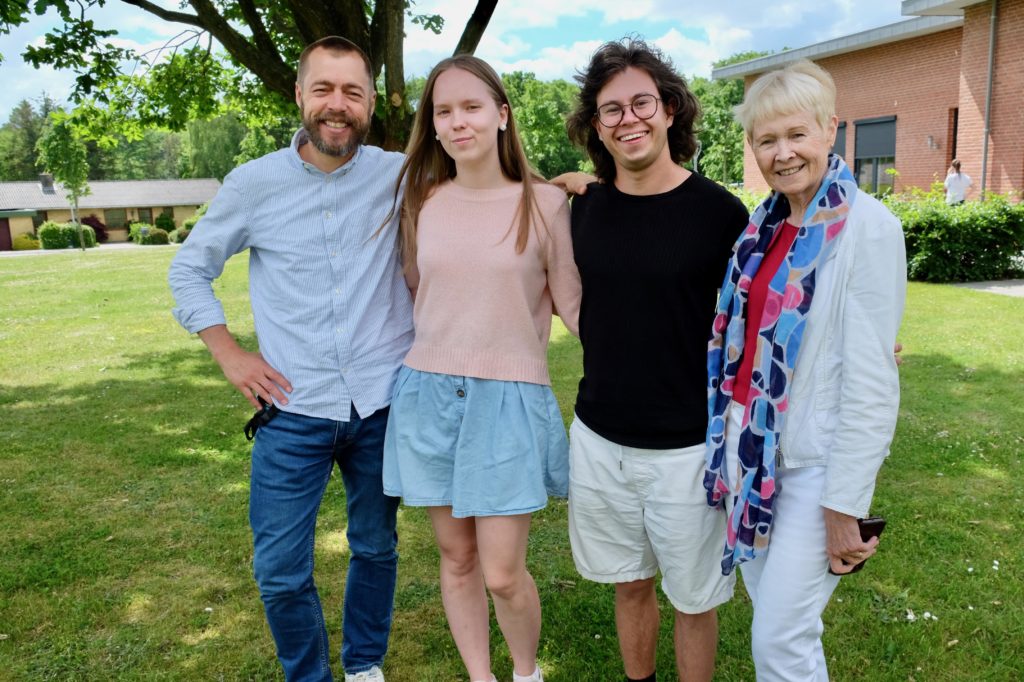
From a struggling child at an orphanage to an entrepreneur
It was a challenge for 24-year-old Ken Rebane to see his own value and strengths.
“As for myself – I came from an orphanage…this is the first time – I have found myself. When I came to Denmark, I realised that there is another Ken that needs attention. As a result, today I feel so much more freedom. Now I’m ready to think about the future – what it is I wish to do in my life,” he says.
Ken Rebane keeps bringing up the value of the social and democratic education he received and has participated in in Denmark. More specifically, he refers to classes on psychology, diaconia and management. On top of that is, of course, also the added value of the human relationships that are impossible to place on a curriculum.
“The best things I have learnt are the psychological aspects and social support from teachers and other students. Now, I can have relationships with and be important to others. It has been a hard journey where I have gone through things that needed to be healed. I can say I have recovered…and now it is time to move on with my life,” says Ken Rebane.
He continues, slowly, deliberately and a bit ceremoniously.
“I have a dream of creating an institution or school where young adults with an orphanage background can come and feel safe and be a part of an environment where they can grow, flourish, and learn about life, psychology and the power of social support. It would be amazing if I could build a school in Estonia and bring with me what I have learnt here,” he says.
Bring it back home!
Simon Linde believes that the highest achievement is when a student has the motivation, drive and energy to use what they have experienced and learnt in Denmark back in their home counties.
”A lot of the students wish to stay in the West, and I think that is a shame. The goal with all of this is that they travel back home and bring with them their knowledge of life, democracy, and social education, and that they put this to good use for themselves and the people around them – for their own country and for future generations,” he says.
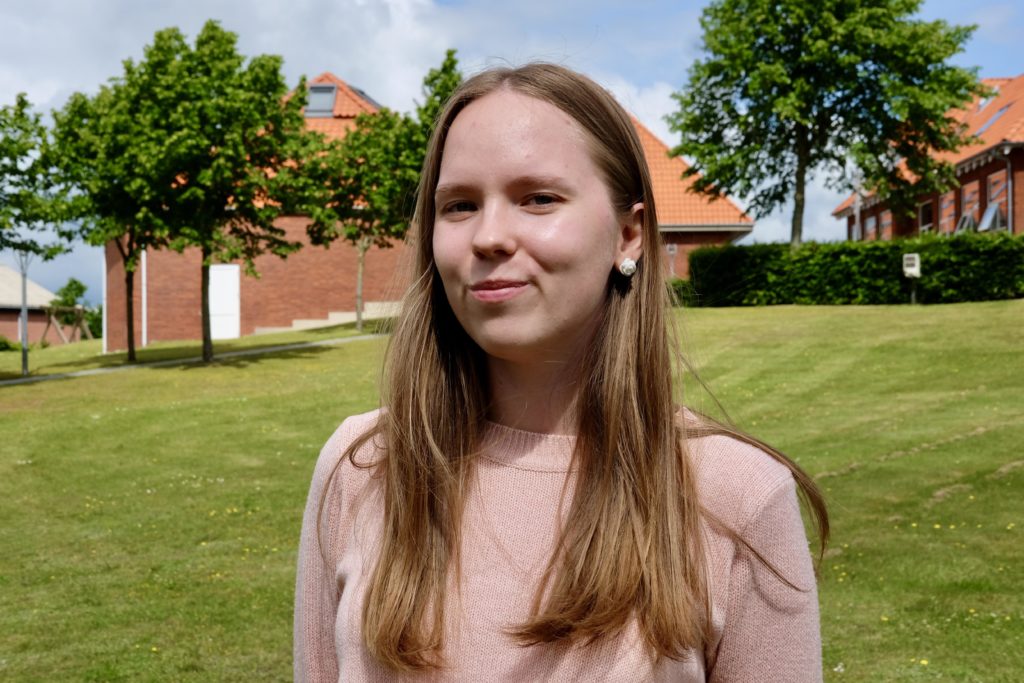
With this class, it seems to have gone well. Rael Mariel Metsamaa also wants to make a difference back home in Estonia. She is 21 years old and has been a student at Mariager Folk High School for almost a year – and she did not really have any expectations before she arrived.
”I did not plan on coming,” she says, while she smiles and laughs.
When Rael Mariel Metsamaa was given the opportunity to go and stay at a folk school in Denmark she felt that she simply had to do it, even though it was all new to her.
“I didn’t have that many expectations, but I think the experience has meant a lot more than I thought it would! It has broadened my horizons. European countries all look alike, but they are also very different, and it has been so cool to see diverse cultures and meet such different people. Actually, it is hard to put into words,” she says.
Mariager Folk High School offers primarily 11-month courses and often has students stay at the school for two years. During the second year, classes are taught in English, and this is where all the international students are. As part of the course, they are responsible for groups of first-year students, whom they must guide through different tasks, social events, and so on.
”I’ve never seen myself as a leader, but that has changed during the last year,” she says.
In fact, the commitment of the teachers has rubbed off on Rael Mariel Metsamaa and she is considering becoming a teacher herself.
”This school is unique! I feel that the teachers really love what they do, and they care about the students. We do not have anything like it! In the Baltic countries, focus is on formal education, and it is not normal to have a gap year,” she says.
In fact, occasionally it has been difficult to focus on the classes she had initially decided to take.
“Sometimes it feels like there are so many fun things going on that it is hard to study. You must be strict with yourself – if you want to learn and study,” she says, and emphasises that she has done both and that she has learnt a lot.
Facts
- NextStep Piiblikool – www.piiblikool.ee
NextStep Piiblikool is a Christian school/evening school and church community in Estonia, that offers a one year of full-time study programme for young people after high school education and holds an evening school in deaconry, ministry, etc.
Piiblikool receives no government support, but regularly receives donations from private and church organisations.
The school was established in 2016, inspired in large part by Mariager Folk School in Denmark. The full-time study programme normally has six students a year and there are four permanent teachers. - Mariager Højskole - www.mariagerhojskole.dk
Mariager Folk High School is a Danish folk school established in 1954 with a Christian value base. The school offers mostly long-term courses of 11 months and a smaller number of short courses. The school hopes that students will stay at the school for two years. Approximately 30% are international students, the rest are Danish.
In addition to a traditional Danish stay at a Folk High School, with focus on general citizenship education, community and personality development, studies at bachelor level are also offered in collaboration with international universities, etc.
- What is a Danish Folk School / Folk High School?
A folk high school is a non-formal residential school offering learning opportunities in almost any subject. Most students are between 18 and 24 years old and the length of a typical stay is 4 months. It is a boarding school, so you sleep, eat, study and spend your spare time at the school. There are no academic requirements for admittance, and there are no exams - but you will get a diploma as a proof of your attendance.
Source: www.danishfolkhighschools.com
Read the article in Nordic (Danish)
Coordination Institution
- Mariager Folk High School
Partner Institutions
- NextStep Piiblikool
- Mariager Folk High School
Program
- Adult
